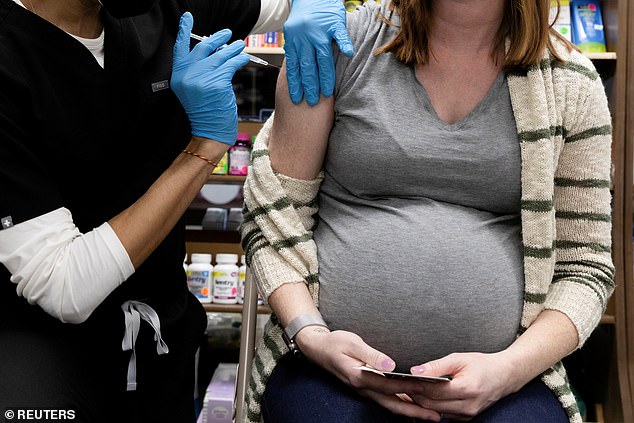Pregnant women who have a Covid vaccine pass on their protection to their unborn babies, a study has suggested.
Researchers from New York University took blood samples from 36 babies delivered by mothers given either the Pfizer or Moderna vaccine.
Results showed they all had coronavirus-fighting antibodies. Mothers in the second half of their pregnancy had the highest antibody levels in the blood in their umbilical cord, the study found.
Experts said the results weren’t surprising because it happens with other jabs.
But they insisted that findings prove vaccines have the ‘power to protect two lives at once by preventing severe illness in both mothers and babies’.
Dr Ashley Roman, an obstetrician at NYU and one of the lead authors said: ‘If babies could be born with antibodies, it may protect them in the first months of their lives, when they are most vulnerable.’
Children face a tiny risk of falling seriously ill with Covid, a plethora of studies have shown since the pandemic began. But the risk is slightly higher among babies, who have weaker immune systems.
But data from Public Health England (PHE) shows pregnant women in Britain are still hesitant to receive a jab, with just 10 per cent coming forward for an appointment by the end of July — the most recent date data is available for.
This is despite women having been eligible for the vaccine at the same time as the rest of their age group since April.

Pregnant women who have had a Covid vaccine pass on high levels of antibodies to their children, a study by New York University has suggested
The numbers are slightly higher in the US, where 23 per cent of pregnant mothers are vaccinated, according to the Centers for Disease Control and Protection (CDC).
All studies so far have suggested mRNA vaccines, such as Pfizer and Moderna, are safe for pregnant women, with no proof behind claims they cause stillbirths or defects.
The latest NYU research was published in the American Journal of Obstetrics and Gynecology — Maternal Fetal Medicine.
Despite the low sample size ‘it is encouraging neonatal antibody levels are high if women are vaccinated’, according to lead author Dr Jennifer Lighter.
She said: ‘High levels of transplacental antibody transfer aren’t surprising. It is consistent with what we see with other immunisations.
‘Our findings add to a growing list of important reasons why women should be advised to receive the Covid vaccine during pregnancy for the added benefit of their newborn receiving crucial protection.’
It comes amid a concerted push by health chiefs to encourage pregnant women to come forward for a jab.
Severe illness due to Covid is uncommon in pregnant women, but is more likely in the third trimester.
Pregnant women who do fall ill with the virus are two to three times more likely to give birth to their baby prematurely, some studies have shown.
Women in the UK are advised to get the Pfizer and Moderna vaccines because these vaccines have been given to over 130,000 pregnant women in the US and the data have not raised any safety concerns.
Dr Mary Ramsay, head of immunisation at PHE, said: ‘It is encouraging thousands of pregnant women have received a Covid vaccine.
‘We strongly urge anyone who has not yet taken up the offer to get both doses as soon as possible and for pregnant women to come forward for their second dose eight weeks after their first dose.’
Dr Edward Morris, president of the Royal College of Obstetricians and Gynaecologists, said: ‘We are encouraged to see more than 50,000 pregnant women in England have received one dose of a Covid vaccine.
‘We recommend vaccination in pregnancy as it’s the most effective way of protecting women and their babies from severe illness and premature birth.
‘We are concerned that increasing rates of Covid infection will adversely impact pregnant women.’
Are Covid vaccines safe for pregnant women and how many have had a jab?
How many pregnant women have had a Covid vaccine?
Data from Public Health England (PHE) shows pregnant women in Britain are still hesitant to receive a jab, with just 10 per cent coming forward for an appointment by the end of July — the most recent date data is available for.
Some 51,724 pregnant women in England had received at least one dose, while 20,648 women had two.
Are there any risks to the mother or baby from taking a jab?
The Royal College of Obstetricians and Gynaecologists recommends that all pregnant women accept the offer of a Covid vaccine.
All major studies show pregnant women are just as safe as the non-pregnant population when it comes to the jab.
And there is no evidence the vaccines have any negative effects on unborn children, with spike in birth defects or stillbirths recorded in inoculated mothers.
Data had been sparse on safety in pregnant women earlier in the year, meaning they were not added to the list of people allowed to have a jab until April in England.
The JCVI decided to wait for data from America to filter through before making a call.
In early April, that data arrived in the form of a major study published by the US Centers for Disease Control and Prevention (CDC). It had tracked the condition of more than 90,000 pregnant women who had received a vaccine, the majority of them in their third trimester.
The CDC was able to report that there were no safety concerns.
Since then, the number of pregnant American women who have had a vaccine has risen to more than 105,000. However, finer data released from within that study set off fresh anxieties.
The CDC closely monitored more than 800 participants. Of that group, 712 had a live birth, while 115 suffered a loss of pregnancy.
Advertisement
Source link : https://www.dailymail.co.uk/news/article-10016407/Pregnant-women-Covid-vaccine-pass-antibodies-babies-womb.html











